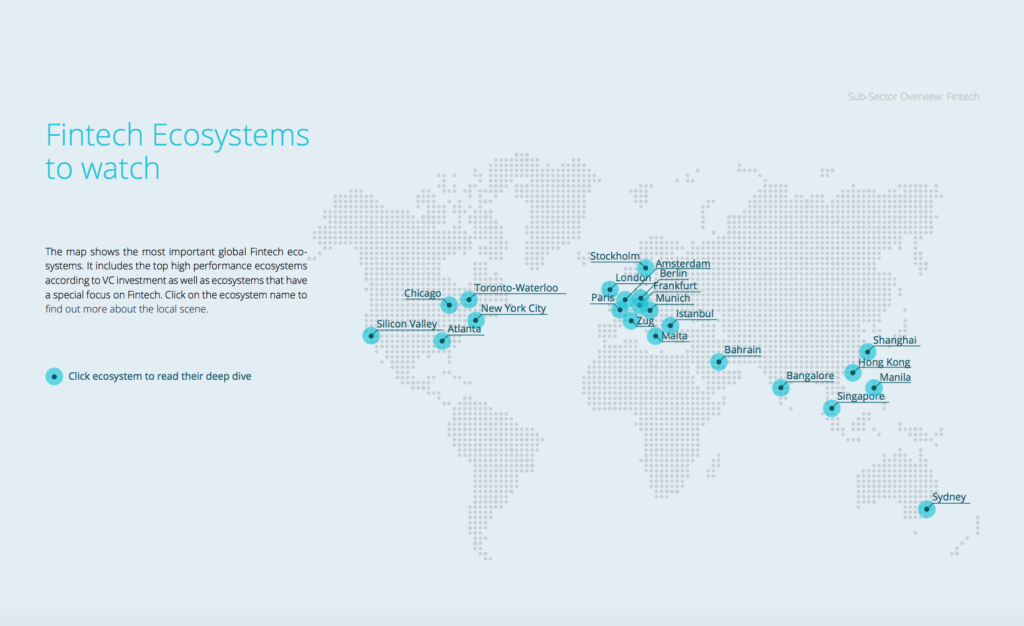Frankfurt is on the path to become a world leading fintech hub, leveraging Germany’s economic strengths in the tech industry and the city’s position as the European Union’s financial center, according to Startup Genome’s annual startup ecosystem report.
 Frankfurt currently employs over 70,000 people in the financial services industry and is home to five Forbes 2000 companies in the financial industry with a combined market capitalization of US$66.3 billion.
Frankfurt currently employs over 70,000 people in the financial services industry and is home to five Forbes 2000 companies in the financial industry with a combined market capitalization of US$66.3 billion.
Based on these unique advantages and assets, the ecosystem is focusing on building a fintech cluster through targeted programs such as accelerators, corporate involvement initiatives and co-working spaces.
“The ecosystem’s focus on fintech is clear,” the report claims.
“Frankfurt has the highest concentration (tied with another ecosystem) of startups in a given sub-sector globally across the nearly 100 ecosystems we studied. In addition, more than 50% of local venture capital investment went into its fintech startups between 2012 and 2017.”
Nearly all major banks and financial institutions in the world have their German headquarters or global headquarters in the city. Today, Frankfurt hosts more than 300 banks as well as the largest stock exchange in Continental Europe, Deutsche Borse Group.
Most of these banks and financial institutions have launched programs specifically tailored towards the needs of fintechs and insurtechs. For instance, Deutsche Bank launched Digitalfabrik in September 2016, a program that supports the development for digital banking products. Commerzbank introduced the Main Incubator, the bank’s investment arm and incubator targeting fintech startups, in March 2014. Deutsche Borse unveiled Fintech Hub in 2016, an initiative aimed at supporting the fintech community in Frankfurt and in the Rhein/Main region.
In addition to bank-led initiatives, Frankfurt also boasts a large pool of accelerator programs such as Accelerator Frankfurt and Finlab. These were established to nurture the region’s most promising ventures in the areas of fintech, regtech, insurtech, and more.
One of the newest programs to arrive in the city is the iconic Silicon Valley accelerator program Plug and Play, which launched a new European fintech program in collaboration with TechQuartier earlier this year. Launched in 2016, TechQuartier is an international community, incubator and co-working place. It aims to serve as a focal point to the startup and fintech community in Frankfurt as well as a platform connecting all stakeholders in the financial services industry.
Omeed Mehrinfar, regional director of EMEA at Plug and Play, said the company was looking to establish “a centralized accelerator hub for our innovation activities in the fintech space across Europe” in Frankfurt.
Saeed Amidi, CEO and Founder of Plug and Play, noted that Frankfurt was a major financial capital and “on track to also become a global fintech hub.”
Alongside TechQuartier, The Spot is another fintech hub that was launched in 2017. Its main tenants are Commerzbank Group’s Main Incubator, startup companies such as robo-advisory services provider Ginmon and digital payment services provider Billwearl, as well as fintech-focused venture capital firm Digital+Partners.
One of Frankfurt’s most notable success stories is foreign exchange trading company 360T, which was acquired in October 2015 for nearly US$800 million by Deutsche Borse, which runs the Frankfurt Stock Exchange. The acquisition is still to date the largest fintech exit to ever take place in Germany.
Other notable fintech ventures in Frankfurt include insurance robo-advisor Clark, which raised US$29 million in its Series B funding round in April, and AI startup Arago, which raised US$55 million in 2014 from KKR & Co.
Last year, Deloitte ranked Frankfurt as the third largest fintech hubs in Europe, behind only to London and Zurich.

Global Startup Ecosystem Report 2018
Along with pointing out Frankfurt’s rapidly growing fintech industry, the Startup Genome’s Global Startup Ecosystem Report 2018 also notes China’s continued dominance in the global fintech scene.
China is the largest market for digital payments with mobile payments reaching US$5.5 trillion in volume in 2017, or 50 times largest than the US market with US$112 billion.
China is also home the Ant Financial, the country’s largest fintech company with a valuation of about US$60 billion.
It also noted the growth of wealthtech and robo-advisors supported by advances in the fields of AI, Big Data and machine learning technologies, as well as increasing demand for security and better recognition infrastructure related with the rise of mobile payment systems and digital wallets.
Biometric authentication, which includes technologies like face recognition systems, iris detection and fingerprint recognition, will be increasingly used in a variety of bank and payment scenarios, such as withdrawing cash from ATMs, authenticating mobile bank apps.
Featured image: Frankfurt, Germany, Pixabay.






